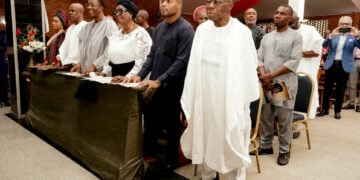Stakeholders have advocated the need for data-driven performance assessment of democratic institutions, especially the legislature to enhance transparency and accountability.
They made the call at the Policy Dialogue and Public Unveiling of the First Session of the 10th National Assembly Deliberative Barometer & Policy Focus Productivity Report themed; ‘Legislative Governance Accountability and Productivity Index: An insight through the ERGAF-AFRICA NASS Deliberative Barometer and Policy Focus Report.’
In his remarks, Speaker of the House of Representatives, Hon. Abbas Tajudeen said the barometer aligned with the vision of the 10th House to entrench evidence-based lawmaking.
Represented by chairman of the House Committee on Monitoring and Evaluation of the Implementation of the Legislative Agenda, Hon. Cyril Hart, Abbas said in an age where governance must respond to data, the Green Chamber recognised that decisions backed by facts are stronger, more credible, and more impactful.
He said the report and dashboard unveiled will serve as a reference point for legislators and stakeholders seeking to evaluate and strengthen parliamentary contributions to national development.
“We must also stress the role of citizens in this new dispensation. Tools like the deliberative barometer are not meant for policymakers alone. They are designed to empower citizens to engage, critique, and make informed demands from their representatives.
“Democracy cannot be sustained without an active and enlightened citizenry, and initiatives such as this provide the bridge to close the gap between representation and public expectation,” Abbas said.
For his part, Director General of National Institute for Legislative and Democratic Studies (NILDS), Prof. Abubakar Sulaiman, in an era of artificial intelligence and data-driven decision-making, the importance of data-driven performance assessment of democratic institutions is critical for enhancing transparency and accountability of Nigeria’s governance institutions.
Represented by a director at the institute, Dr Shuaibu Dawanka, the director general urge readers and users of the data provided by the ERGAFAfrica to make use of the data within the proper context.
“This is because the legislature works as a system; thus, attempting to fragment their performance into individual contributions may not totally present a proper picture of how the legislature works.
“Assessment of bills presented by individual legislators or a group of legislators, for instance, may not be traced to that particular member or senator alone,” he said.
Also speaking, the Executive Director of Civil Society Legislative Advocacy Centre (CISLAC)/ TI-Nigeria, Awwal Musa Rafsanjani, said deliberative barometer offers an innovative scorecard that enables Nigerians to evaluate the legislature’s performance.
This, he said would enable citizens understand the impacts of legislative active actions and ensure that lawmakers remain responsive to needs and aspirations of their constituents across the country.
“This report reflects the need for lawmakers to cultivate a culture of open dialogue, active engagement, and inclusive governance. It provides a framework for evaluating the advancements made by the legislature in meeting its obligations, tackling pressing societal challenges, and enhancing the overall effectiveness of legislative processes in the 10th Assembly in Nigeria.
“Through its insights, lawmakers can identify areas where they need improvement, recognize their accomplishments, and ensure accountability to the Nigerian people,” Rafsanjani said.
On his part, the Founding Executive Director of Centre LSD, Dr Igbuzor, said the Legislative Governance Accountability and Productivity Index (LGAPI) represents a significant innovation in Nigeria’s democratic accountability framework.
“By integrating deliberative quality, policy productivity, and oversight effectiveness, it offers a holistic measure of legislative governance. ERGAF-Africa’s approach has the potential to transform both parliamentary performance and civic participation in Nigeria.
“Going forward, we recommend that ERGAF-Africa should partner with other civil society organisations, utilize infographics, town halls, conventional and social media to enhance citizens literacy on legislative performance. It is also important to improve the credibility of elections so as to improve the legitimacy of political leaders in Nigeria.
“Ultimately, institutionalizing tools like the LGAPI is vital for deepening democracy, enhancing legislative leadership, and ensuring that Nigeria’s legislature fulfills its constitutional mandate of accountability, representation, and service to the people,” he added.





